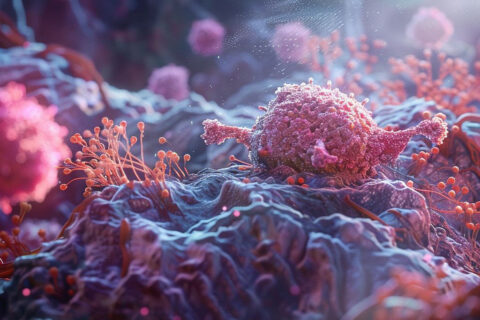Greedy macrophages promote the progression of cancer
FAU researcher receives an award for his contribution to treating bone marrow cancer
Macrophages that “gorge themselves” on a certain protein may promote the progression of cancer rather than fight it. PD Dr. Heiko Bruns, immunologist at FAU, discovered this mechanism in connection with bone marrow cancer. In recognition of his research, which may lead to entirely new approaches to treatment, Heiko Bruns has been awarded the Pro Scientia prize from the Eckhart Buddecke Foundation.
Bone marrow cancer, also known as multiple myeloma, is incurable. However, medical treatments have made good progress in recent years, causing the survival rate to rise from an average of three years to ten years. “Whilst chemotherapy remained the treatment of choice for a long time, nowadays antibody treatments and immune-regulating drugs have become more important,” says Heiko Bruns from the Chair of Hematology and Oncology (led by Prof. Dr. Andreas Mackensen) at FAU and head of the working group at Department of Medicine 5 at Uniklinikum Erlangen.
During his research, Heiko Bruns investigates tumors at the molecular level in order to discover which cells and messenger substances are involved in triggering and promoting the progression of cancer. “We compared biopsies of the bone marrow of patients after their initial diagnosis with those from healthy subjects,” he explains. The decisive tip came from the Department of Biosciences at the University of Milan, with whom the immunologists from Erlangen work closely together: the team of researchers led by Prof. Dr. Stefano Ricagno discovered a high concentration of the protein beta2-microglobulin in samples from patients. According to Heiko Bruns, “we knew that the protein is not only a diagnostic marker, but also has a pro-inflammatory effect itself. However, the underlying mechanism was still unclear.”
More in-depth analyses at FAU were able to decipher this mechanism. They showed that beta2-microglobulin is indeed involved in aggravating multiple myeloma, but in a roundabout way. According to Heiko Bruns, “the protein is absorbed by white blood cells, known as macrophages, that normally eliminate harmful bacteria, viruses and cancer cells. However, the high concentration of beta2-microglobulin has the effect that macrophages literally overeat on it.” In this state, instead of having a healing effect, the macrophages encourage inflammation and promote the growth of the cancer.
The results that Heiko Bruns has published as a corresponding author in the journal “Immunity” together with researchers from Erlangen, Homburg, Bonn, Freiburg and Milan may lead to entirely new approaches to treatment. “One possibility would be to block the beta2-microglobulin to prevent macrophages from overeating it in the first place,” Heiko Bruns explains. “Another approach may be to use suitable substances to suppress the inflammasome NLRP3, the protein complex in the stressed macrophages that triggers the inflammation.” Researcher are currently investigating both strategies in the hope that they will help to further relieve symptoms and increase the life expectancy of patients.
The Eckhart Buddecke Foundation awards the Pro-Scientia prize worth 10,000 euros annually for outstanding achievements in fundamental medical research. “The award does not only recognize my work, but also the work of the whole team in my working group,” Heiko Bruns says. Bruns has had connections to FAU for a long time. He completed his degree in biology at FAU in 2006, and returned to Erlangen in 2010 after completing his doctoral degree in medical microbiology at Universitätsklinikum Ulm. Since 2012, he has been the head of the “macrophages” working group at the Chair of Hematology and Oncology and completed his habilitation on the role of tumor-associated macrophages in malignant lymphomas under his mentor Andreas Mackensen in 2019.
Further information:
PD Dr. Heiko Bruns
Chair of Hematology and Oncology
Phone: + 49 9131 85 43163
